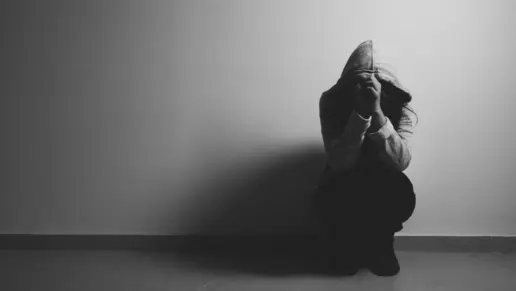Mental illness is very common and the likelihood is high that you or someone you love will experience a mental health concern. A 2023 survey by The Substance Abuse and Mental Health Services Administration (SAMHSA) found that 22.8% of adults aged 18 or older will experience one or more mental illnesses in their lifetime. Schizophrenia is one such mental illness.
According to SAMHSA’s 2023 survey, nearly 1 in 4 adults will face a mental health condition in their lifetime, making mental illness extremely common.
About 1 in 4 people with mental illness will experience a co-occurring substance use disorder, often due to self-medication.
The study also found that approximately 25% of those impacted will also experience a co-occurring substance use disorder. Experts attribute this largely to the attempt to self-medicate with substances in the presence of an untreated or ineffectively managed mental illness.
Paradoxically, however, substance misuse can worsen the symptoms or mental illness and make the primary condition more difficult to treat. The use of substances may also trigger the onset of certain types of mental illness. Among the mental health conditions that may be exacerbated by or co-occurring with substance use disorder is schizophrenia.
What is Schizophrenia?
Schizophrenia is a complex and potentially debilitating mental illness that may cause mild to severe symptoms. Schizophrenia is thought to be caused at least in part by genetics but environmental factors such as stress, infections, toxins, and trauma also appear to play a role.
The condition is characterized by a wide range of perceptual, cognitive, and psychological symptoms. Typically, an individual must experience two of these symptoms at the same time for a duration of at least six months before being diagnosed.
Symptoms of schizophrenia include:
Delusions
Delusions are false beliefs that some event has happened, is happening, or will happen in the future. These beliefs are often persecutory in nature and individuals often feel that someone has mistreated them or someone they love. An example may be the belief that someone is attempting to harm the individual when they are not. Such false beliefs gave rise to the archaic term “paranoid schizophrenia.”
Grandiose thinking
Grandiose ideas are a type of delusion in which the individual experiences a grossly exaggerated sense of self-importance. For instance, they may believe they are the US president, a movie star, or royalty. Grandiose thinking may also be persecutory and the individual may believe him or herself to be a target of powerful persons or entities, such as the CIA. Though not all delusions are persecutory or grandiose, such false beliefs are often a hallmark of schizophrenia and similar conditions.
Hallucinations
Hallucinations are perceptual symptoms that typically involve seeing (visual) or hearing (auditory) things that are not there. Persons experiencing hallucinations may be frightened or angered by what they believe they are seeing and hearing. They are also likely to have trouble differentiating between reality and hallucination. Hallucinations and delusions are often experienced together. For example, the individual experiencing the hallucination may think they overhear a loved one plotting against them or see a menacing stranger following them.
Impaired Thought Processes
This symptom is caused by the individual having difficulty putting thoughts together in a coherent and cohesive way. Speech patterns may become disjointed, illogical, and difficult or impossible to follow. What the individual says may not make sense or they may seem to be unable to describe what they are thinking or feeling.
Disordered speech patterns
Speech may become very rapid and the speaker may leap from one topic to the next at random, a phenomenon called “flight of ideas.” Speakers may end up feeling frustrated or even angry if those around them can’t understand or follow what they are saying. The voice and inflections of a person with schizophrenia may also be affected. For example, the individual may sound different, such as presenting with a stronger accent.
In addition to hallucinations, delusions, and disordered thought and speech patterns, schizophrenia is also often accompanied by a range of cognitive signs. These include:
Trouble focusing or difficulty paying attention.
Memory problems affecting both short and long term memory
Processing problems to include difficulty in processing information or following conversations
Trouble with social cognition including difficulty in picking up on non-verbal cues such as not recognizing that someone is angry or sad
Paranoia and extreme agitation
Difficulty with executive function. Struggling to plan, organize tasks, or make decisions.
Persons with schizophrenia also typically experience so-called “negative symptoms”, which are defined by the significant and prolonged absence of various psychosocial features. These include:
Anhedonia
The inability to experience enjoyment or pleasure
Flat affect
Muted or “flat” facial expression and speaking in a monotone voice
Lack of motivation or energy
This may present as appearing disheveled, not bathing or dressing.
Social withdrawal
Loss of the desire to leave home or avoiding phone calls
Changes in motor control
This may include slowness of movement or unusual posturing.
Alogia
Reduced speech output
Persons with schizophrenia may be hospitalized for stabilization during psychosis events (episodes when disease symptoms are present). Long term treatment includes psychotherapy and medication in the outpatient setting.
Schizophrenia medications are typically called antipsychotic medications. These medications may be given orally or by injection. Mood stabilizers, antidepressants, anti-anxiety agents, and sleep medications may also be prescribed.
What is Dual Diagnosis or a Co-Occurring Disorder?
Dual diagnosis is the term used when an individual has been diagnosed with two or more mental illnesses, to include the diagnosis of a substance use disorder and another mental illness, such as schizophrenia. Other terms for dual diagnosis are co-occurring disorders or comorbidities.
When someone has a co-occurring disorder, it can make treatment of either disorder more challenging. An example of a dual diagnosis would be someone with a diagnosis of schizophrenia with a diagnosis of alcohol addiction at the same time.
Schizophrenia and Addiction
A dual diagnosis of schizophrenia and substance use disorder is not uncommon. Epidemiological studies show that around 47% of persons diagnosed with schizophrenia also have some form of substance use disorder..
Nearly 1 in 2 people diagnosed with schizophrenia experience co-occurring substance misuse, highlighting the need for integrated dual diagnosis treatment.
Individuals may attempt to self-medicate with substances in order to mitigate the often debilitating symptoms of schizophrenia rather than seeking professional care. This may be related to the way people with a diagnosis of schizophrenia have been treated in the past.
They may fear personal and professional stigmatization from such a diagnosis. In addition, antipsychotic medications can sometimes cause unpleasant side effects which may lead sufferers to search for an alternative solution to their symptoms.
Alcohol misuse and illicit substances are not currently known to cause schizophrenia. However, substance misuse has been known to cause changes in the structure of the human brain, which may increase the risk of schizophrenia in vulnerable persons such as those with a genetic, environmental, or experiential predisposition.
Recent studies, for instance, suggest a concerning link between cannabis use disorder and schizophrenia, particularly among young men. Alcohol and drug misuse of all types has been shown to increase or worsen symptoms of schizophrenia.
Common substances used by people with a diagnosis of schizophrenia are nicotine, alcohol, marijuana, opioids, and amphetamines.
Treating Addiction and Schizophrenia
Schizophrenia affects less than 1% of the world population. However, schizophrenia is also one of the top 15 causes of disability worldwide according to the National Institute of Mental Health. Those diagnosed with the illness have a mortality rate or increased risk of death that is 2 to 3 times that of the general population.
When substances are added, it greatly increases risk for worsening illness. One study out of Finland showed that combining substance use in someone with schizophrenia increased hospitalization and mortality or risk of death by 50%-100%. This mortality risk was directly related to increased suicide or suicide attempts.
Other risks include increased or worsening symptoms of schizophrenia, increased risk of sexually transmitted diseases, increased risk of injury of self or others, and worsening risk of physical illness such as heart disease, liver disease and diabetes.
In addition to significant psychological and physiological risks, a dual diagnosis of schizophrenia and SUD is linked to an array of personal and social harms. This may include unemployment, homelessness, loss of social support, and increased risk for crime.
Therapies and Treatment Options for Schizophrenia and Co-Occurring Disorders
Schizophrenia is a chronic illness and typically requires life-long management. Treatment is usually more intensive in the beginning. Once clients have stabilized, the number of visits with the healthcare team may decrease.
Recommendations for treatment include a multidisciplinary team approach. This may include a psychiatrist, psychologist, primary care and specialist physicians, nurses, dieticians, and therapists all. working together to develop, monitor, and manage your care plan. Treatment will typically combine medication and psychosocial therapy with a focus on preventing addiction relapse and managing the symptoms of the co-occurring schizophrenia.
Treatment may occur in the inpatient or outpatient setting. An inpatient stay is typically recommended if the individual is at risk for hurting themselves or others. The risk of such events increases when patients are experiencing a psychotic episode or withdrawing from substances.
There are different types of treatment options for co-occurring schizophrenia and substance use disorder. Many of these treatment options overlap and are recommended for either disorder. This can make concurrent treatment easier to manage.
Treatment often begins with a hospital stay in order to stabilize the individual. For example, if the patient is experiencing psychotic symptoms, a psychiatric unit can provide a safe place to stay until the acute symptoms have resolved. If substances are involved, the individual may need to be hospitalized to safely detox from the medications.
Common therapies for the treatment of co-occurring schizophrenia and SUD include:
Psychotropic medication
Many medications are available for schizophrenia and may be oral or injectable. Medications called antipsychotic medications are typically used. One particular type of antipsychotic medication called partial dopamine agonists are anti-psychotic medications that decrease the risk of becoming addicted to substances and show promise in decreasing the risk of a drug use relapse.
Other types of medications may also be used to reduce anxiety, mitigate depression symptoms, stabilize mood, and improve sleep.
Medication assisted Treatment (MAT)
In addition to psychotropic medications, medication assisted treatment (MAT) for the co-occurring substance use disorder may be provided. FDA-approved drugs may be implemented to reduce cravings and prevent withdrawal symptoms.
Every individual is different so what works for one person may not work for another. It is important to work with your health care professional in finding what works best for you.
Acceptance and Commitment Therapy
This therapeutic approach assists the individual in accepting the reality of their mental health challenges and other challenging life circumstances and committing to making positive changes. This approach teaches clients to set and work toward attainable life goals while becoming empowered to effectively manage their physical, psychological, and emotional wellbeing.
This includes learning to manage their co-occurring mental health conditions effectively.
Contingency Management (CM)
This type of therapy uses incentives to motivate clients to make positive changes. This includes systems of rewards for positive behaviors and consequences for negative ones. An example of a contingency management approach might involve having your name put into a prize drawing if you meet a specific recovery goal versus not getting put into the drawing if you do not meet the goal.
Cognitive Remediation Therapy (CRT)
This evidence-based therapy uses exercises to improve memory, attention, and cognition. This therapy may be offered in a group or private setting or remotely through telehealth.
Cognitive Behavioral Therapy (CBT)
This type of therapy utilizes a one-on-one approach with your health professional to learn to replace negative thoughts with more realistic or accurate thoughts. Replacing negative thought patterns with more affirming and constructive ones can help with emotional regulation, anxiety, depression, and other emotions that might worsen disease symptoms and increase relapse risk.
Motivational Interviewing (MI)
This type of therapy allows the individual to focus on what is most important to them and uses that motivation to change behavior through strategic goal setting.
Ketogenic Diet
Recent studies suggest that the ketogenic diet may decrease schizophrenia symptoms by reducing inflammation in the brain. These studies are also showing promise that following the diet may decrease cravings for substances
Finding a Drug Rehab Near You
When considering entering rehab, it is important to compare facilities and treatment options. Fundamentals such as location and cost, and inpatient versus outpatient options, are critical. Many facilities offer inpatient options to stabilize the symptoms, then offer outpatient follow-up.
If you have co-occurring disorders, then a dual diagnosis rehabilitation center is probably best for you. Look for facilities that support integrated recovery for SUD and co-occurring mental disorders.
If you have insurance, including Medicare or Medicaid, your insurance representative can be asked to review options in your plan. If you do not have insurance, you may find a low or no cost option.
You can learn about dual diagnosis treatment centers in your area through an online rehab directory search. If you have difficulty with this, a friend or family member may help you. Most rehab facilities explain the treatment options that they offer. Your trusted health care team may offer suggestions as well as friends and family.
Once you begin treatment, it is important to keep appointments and participate in therapies and maintain medications as prescribed.
Addiction Centers That Treat Dual Diagnosis
Finding facilities near you…




